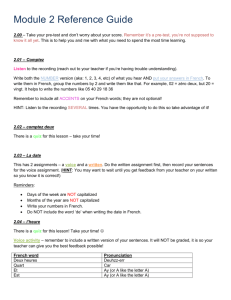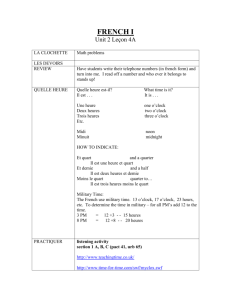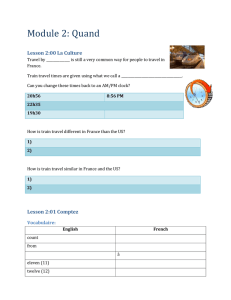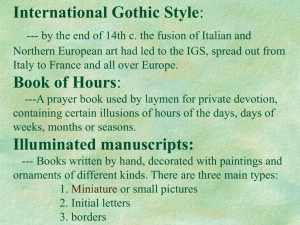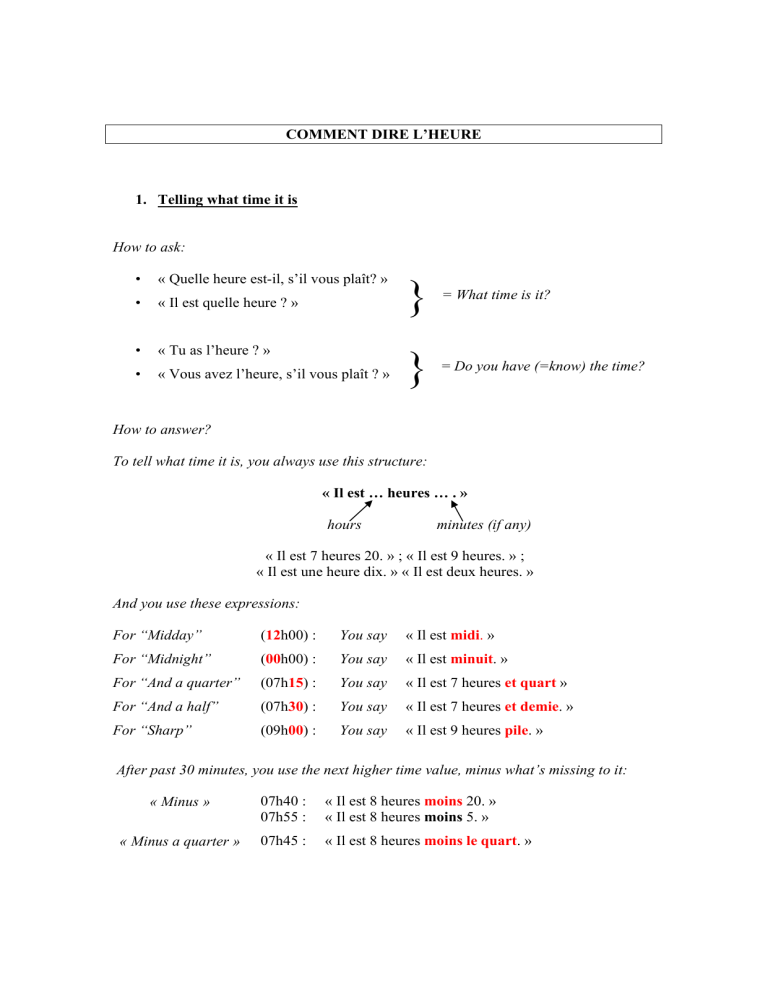
COMMENT DIRE L’HEURE 1. Telling what time it is How to ask: • « Quelle heure est-il, s’il vous plaît? » • « Il est quelle heure ? » • « Tu as l’heure ? » • « Vous avez l’heure, s’il vous plaît ? » } = What time is it? } = Do you have (=know) the time? How to answer? To tell what time it is, you always use this structure: « Il est … heures … . » hours minutes (if any) « Il est 7 heures 20. » ; « Il est 9 heures. » ; « Il est une heure dix. » « Il est deux heures. » And you use these expressions: For “Midday” (12h00) : You say « Il est midi. » For “Midnight” (00h00) : You say « Il est minuit. » For “And a quarter” (07h15) : You say « Il est 7 heures et quart » For “And a half” (07h30) : You say « Il est 7 heures et demie. » For “Sharp” (09h00) : You say « Il est 9 heures pile. » After past 30 minutes, you use the next higher time value, minus what’s missing to it: « Minus » 07h40 : 07h55 : « Il est 8 heures moins 20. » « Il est 8 heures moins 5. » « Minus a quarter » 07h45 : « Il est 8 heures moins le quart. » If you want to specify if you are talking about the morning or afternoon, you can use: am pm pm « Il est 7 heures du matin » (from midnight to noon) « Il est 3 heures de l’après-midi. » (from noon to more or less sunset) « Il est 7 heures du soir. » (from sunset to midnight) In casual conversation, you'll still hear French people tell time this old-fashioned (analog) way, with all of the above expressions. For airline itineraries, train timetables, administration, it's strictly the 24-hour system. The 24-hours system is quite simpler, as you never use the special vocabulary / expressions above; numbers only! 12h30 : 14h50 : 00h15 : 09h45 : « Il est 12 heures 30. » « Il est 14 heures 50. » « Il est 0 heure 15. » « Il est 9 heures 45. » But French seldom use it in conversation… 2. Describing a schedule. To describe your daily schedule accurately, learn how to talk about the days of the week, the moments of the day, the time and the frequencies: The days of the week: lundi mardi mercredi jeudi vendredi samedi dimanche Monday Tuesday Wednesday Thursday Friday Saturday Sunday In French, to express that something is happening on Monday, you simply say: « J’ai un test lundi. » “I’ve got a test on Monday.” « L’anniversaire de ma sœur est samedi soir. » “My sister’s birthday is Saturday evening.” If you want to say that something is happening every Monday, then you say: « J’ai (un) cours de français le lundi matin. » ‘I’ve got a French class every Monday morning.” « Je fais du sport le dimanche. » “I do sports every Sunday.” Today is “aujourd’hui” Tomorrow is “demain” Yesterday is “hier” Moments of the day: Le matin À midi L’après-midi Le soir La nuit (the morning / in the morning) (at noon / at lunch time) (the afternoon / in the afternoon) (the evening / in the evening) (the night / in the night – be careful in French, ‘night’ is different from ‘evening’ – it’s strictly night time as in bed time!) For example you can say: « Je travaille bien le soir. » (“I work well in the evening.”) « J’aime faire du sport le matin. » (“I like to do sport in the morning.”) Or, mentioning a day of the week: « J’ai un cours d’anglais le lundi après-midi. » (“I have an English class every Monday afternoon.”) « Je déjeune avec mon frère samedi midi. » (“I have lunch with my brother Saturday noon.”) Or also: Ce soir (this evening / tonight) Ce midi (this noon, at noon today) Cet après-midi (this afternoon) Ce matin (this morning) Cette nuit (this night – it doesn’t translate ‘tonight’! ‘Tonight’ is Ce soir) Demonstrative article: how to say this / that in French. Use CE for masculine + consonant sound (ce soir / ce lundi / ce weekend) Use CET for masculine + vocal sound (cet après-midi / cet ami) Use CETTE for any feminine (cette nuit / cette semaine) Use CES for any plural (ces jours) These are the main meals of the day: Le petit-déjeuner Le déjeuner Le dîner (the breakfast) (the lunch) (the dinner) When they want to say that they are having a meal, French never use the verb to have! They like to simply conjugate the verbs petit-déjeuner, déjeuner and dîner. They are regular verbs: « Je petit-déjeune » « Tu déjeunes » « nous dînons » Le déjeuner = the lunch (masculine noun) Je déjeune = I’m having lunch (regular verb) You can refer to events to describe your schedule as during, before or after something: Pendant Avant Après During Before After Examples: « J’écoute la radio pendant le petit-déjeuner. » “I listen to the radio during breakfast.” « Je te téléphone avant le déjeuner. » “I call you before lunch.” « J’étudie après le dîner. » “I study after dinner.” Frequency: souvent jamais parfois toujours fois tous les jours often never sometimes always times (like in how many times) everyday Examples: « J’étudie souvent à la bibliothèque. » (“I often study in the library.”) « Je ne déjeune jamais avant midi. » (“I never have lunch before midday.”) « Je mange parfois à Tronoh. » (“I sometimes eat in Tronoh.”) « Je petit-déjeune toujours. » (“I always have breakfast.”) « Je fais de la natation deux fois par semaine. » (“I swim two times per week.”) « Je mange trois fois par jour. » (“I eat three times per day.”) « Je fais du sport tous les jours. » (“I do sports everyday.”) Pay attention to jamais. It is used with ne: ne…jamais follows the same placement rule as ne…pas. Jamais can replace pas in a negative sentence. Adverbs, such as bien, beaucoup, souvent, parfois, express how well, how often or how much you do something. In French, these adverbs are generally placed directly after the conjugated verb like in the examples above. However en général (generally) or d’habitude (usually) can also often be placed at the beginning or end of the sentence: « Je ne mange jamais le matin, d’habitude. » « En général, je dîne après huit heures. » Time: To specify the time at which something happens, you will use à before the time: « Il arrive à 7 heures. » (“He arrives at 7 o’clock.”) « Je déjeune à midi. » (“I have lunch at midday.”) « Rendez-vous à 6 heures. » (“Appointment at 6 o’clock.”) If it’s a period of time, then you will open it with de (=from) and close it with à (=to): « J’ai un cours de 8 heures à 10 heures. » (“I have a class from 8 o’clock to 10 o’clock.”) « Je fais du tennis de 5 heures à 6 heures. » (“I play tennis from 5 o’clock to 6 o’clock.”) « Je suis à Kuala Lumpur de mardi à jeudi. » (“I am in KL from Tuesday to Thursday.”) To ask question about the time, you say: « À quelle heure il arrive ? » (“At what time does he arrive?”) « Le cours de français est à quelle heure ? » (“At what time is the French course?”) « Tu travailles de quelle heure à quelle heure ? » (“You work from what time to what time?”) Be careful, do not mix up: « Quelle heure est-il ? » (what time is it? – now!) « À quelle heure ? » (at what time? – is something taking place) « Quelle heure il est? » > « Il est trois heures et demie. » (“What time is it?” > “It’s three thirty.”) « A quelle heure tu as cours ? » > « J’ai cours à quatre heures. » (“At what time do you have class?” > “I have class at four.”)
